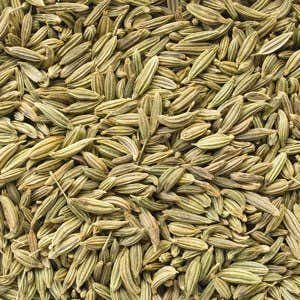
This member of the celery family is a well-known herb native to southern Europe and western Asia, but it was known in ancient China (as xiao hui xiang) as well as in India, Egypt, and Greece.
In the Middle Ages it was prized as a vegetable and indeed is appreciated for its flavor today. Colonists brought it to the New World.
Some herbal references distinguish between sweet and bitter fennel. Although the entire plant is edible, only the fruits (“seeds”) and their essential oil are used medicinally. The fruits are collected in August and September when they are ripe and then dried.
In China, it is considered a “wind-dispelling herb,” restoring normal stomach function, dispersing cold, and restoring the flow of Qi (pronounced chee). Aside from the specifically Chinese concept of Qi, these uses are remarkably similar to those in European herbal medicine.
Active Ingredients
The dried fruits of the fennel plant contain an essential oil (2 percent in sweet fennel, 4 percent in bitter fennel). This oil contains anethole (80 percent in sweet fennel, at least 60 percent in bitter fennel), fenchone, and estragole.
Alpha- and beta-pinene, limonene, and beta-myrcene have also been identified, along with anisaldehyde. The fixed oil present at levels of approximately 20 percent contains oleic acid, vitamin E, and petroselinic acid.
Caffeic acid and its derivatives and flavonoids including quercitin, isoquercitin, and kaempferol compounds occur in sweet fennel.
Uses of Fennel
In traditional herbal medicine, fennel was used to treat indigestion and flatulence, encourage production of breast milk, improve sex drive, increase urination, and bring on menstrual bleeding.
An extract of fennel demonstrated estrogenic effects in both male and female rats, but this activity has not been utilized further. In Europe, in addition to digestive complaints, it is recommended for colds and congestion. An extract had measurable anti-inflammatory activity in experiments using rat paws.
In laboratory studies, fennel oil increased movement of the stomach but counteracted spasms of smooth muscle in the gut. Perhaps this activity explains its reputation in treating flatulence.
Findings on the oil’s toxicity are contradictory. In one study, the volatile oil aggravated chemical liver damage, but in more recent research an anethol compound protected against chemical toxicity.
Dose
The infusion is made by pouring 2Ú3 cup boiling water over 1 to 2 teaspoons (2 to 5 g) of the dried fruit crushed immediately beforehand, steeping for ten to fifteen minutes, and straining it.
Maximum daily dose is 7 g of fennel.
Fennel infusions may be taken for as long as desired, but stronger forms of the herb such as extracts should not be used for more than two weeks except under medical supervision.
Use of the volatile oil is not recommended.
Special Precautions
Anyone allergic to celery, carrots, dill, or anise should avoid fennel. Pregnant women should not use fennel oil or fennel extracts, but infusions of fennel seeds are not believed to be harmful.
Adverse Effects
The volatile oil can cause nausea, vomiting, hallucinations, and seizures. Pulmonary edema has also been reported. Infusions rarely cause side effects of any kind, but the fruits may be contaminated with toxic bacteria. People who handle fennel may experience exaggerated sunburn or rash on exposure to the sun, as the plant can trigger phototoxicity and contact dermatitis.
Possible Interactions
No interactions have been reported in the literature at this time.

